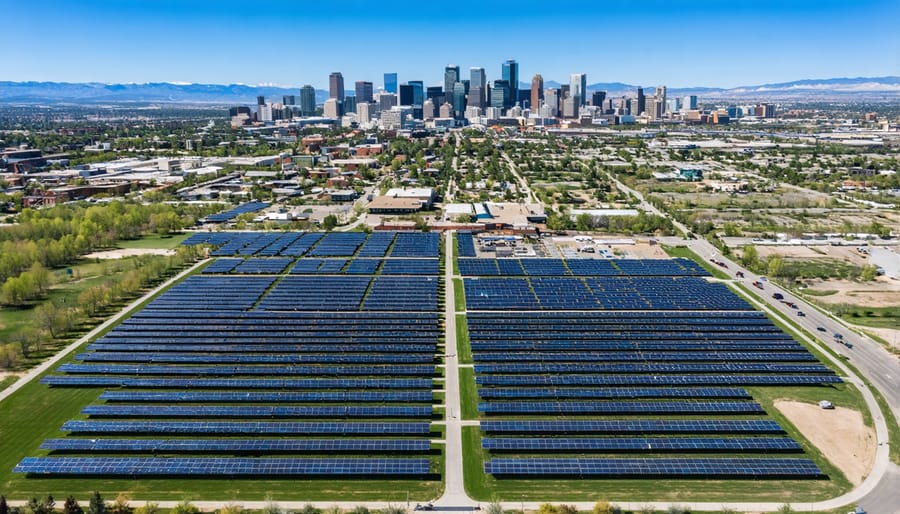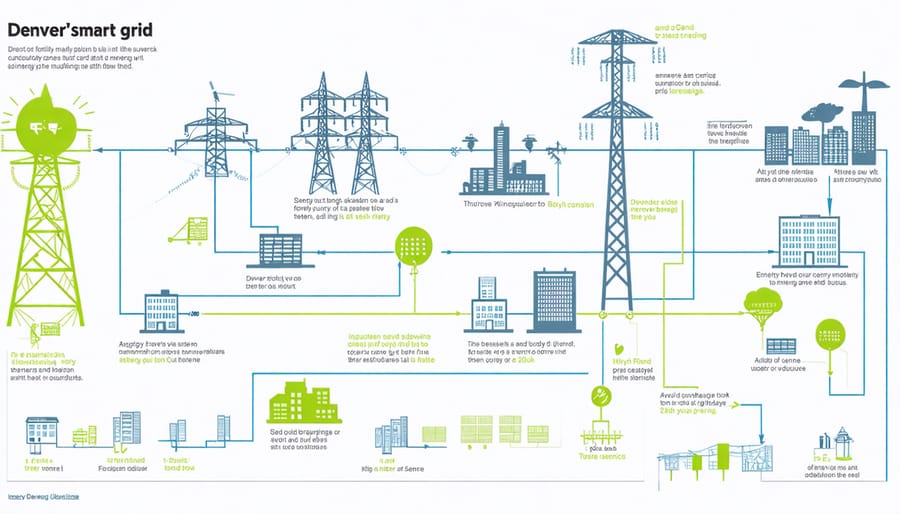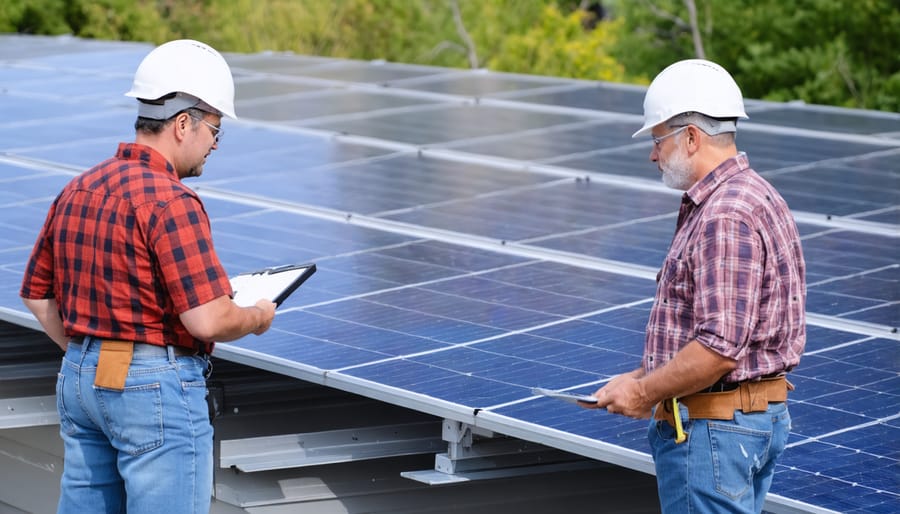Transforming our cities through green energy infrastructure represents more than just an environmental imperative—it’s becoming the economic backbone of sustainable urban development. As communities worldwide race to meet ambitious renewable electricity goals, innovative infrastructure solutions are reshaping how we power our neighborhoods, businesses, and public spaces. From advanced solar installations and wind energy systems to smart microgrids and energy storage facilities, these technologies are creating resilient urban ecosystems while generating thousands of clean energy jobs.
The integration of green energy infrastructure marks a pivotal shift in urban planning, where sustainability meets practical necessity. Cities that invest in renewable energy systems not only reduce their carbon footprint but also build long-term economic resilience, protect against energy price volatility, and create healthier communities. This transformation requires thoughtful collaboration between public utilities, private sector innovation, and community engagement—creating a blueprint for sustainable urban development that other cities can follow.
These initiatives represent more than just environmental stewardship; they’re catalysts for economic growth, job creation, and community empowerment. The future of urban development lies in our ability to seamlessly integrate these sustainable solutions into the fabric of our cities.
Denver’s Current Green Energy Landscape
Solar Initiatives and Urban Solar Gardens
Denver’s commitment to solar energy shines through its innovative programs and partnerships, making renewable power accessible to more residents than ever before. The city’s solar initiatives include an expanding network of community solar gardens, allowing residents who can’t install rooftop panels to benefit from solar energy through shared installations.
These urban solar projects particularly benefit renters and homeowners with shaded properties, enabling them to subscribe to local solar arrays and receive credits on their energy bills. Notable success stories include the Colfax Garden, which powers over 300 households, and the Green Valley Ranch installation, which provides clean energy to local schools and municipal buildings.
The city’s Solar Workforce Development Program creates green jobs while expanding solar access, training local residents in solar installation and maintenance. Neighborhood ambassadors help spread awareness about solar opportunities, making the transition to renewable energy a community-driven effort that strengthens local resilience and reduces carbon emissions.

Wind Power Integration
Denver’s wind power initiatives have transformed the region’s energy landscape, with innovative projects seamlessly integrating renewable energy into the existing power grid. The Front Range Wind Farm, located just east of the city, now supplies clean electricity to over 50,000 homes while creating local jobs and reducing carbon emissions.
The city’s smart grid system enables efficient management of wind power fluctuations, ensuring stable energy delivery even during varying weather conditions. Local utility companies have implemented advanced forecasting technologies and energy storage solutions to maximize wind power utilization, making Denver a model for urban wind energy integration.
Community wind projects have gained particular traction, with neighborhood cooperatives investing in shared turbines. These initiatives not only generate clean energy but also provide revenue streams for participating communities. The Denver Wind Partnership Program offers resources and technical assistance to businesses and organizations interested in implementing their own wind power systems.
Notable success stories include the Denver International Airport’s wind farm, which meets 10% of the facility’s electricity needs, demonstrating how large-scale infrastructure can effectively incorporate renewable energy solutions.

Smart Grid Technologies and Energy Storage
Battery Storage Systems
Battery storage systems are revolutionizing Denver’s approach to renewable energy management, enabling the city to capture and utilize solar and wind power more effectively. The city has implemented several innovative storage solutions, including the groundbreaking Panasonic Tower facility, which houses one of the largest battery arrays in the region.
Local neighborhoods are benefiting from these installations through increased grid reliability and reduced power outages. The Baker district’s community battery project, for instance, has helped residents maintain power during peak usage periods and severe weather events, while simultaneously reducing energy costs for participating households.
Denver’s battery initiatives extend beyond large-scale facilities to include smaller, distributed storage systems. The Green Battery Program allows homeowners and businesses to install storage units that connect to the city’s smart grid network. These systems not only provide backup power but also help balance the grid’s overall load, creating a more resilient energy infrastructure.
Community advocates like Maria Rodriguez have been instrumental in promoting these storage solutions. “We’ve seen a 30% reduction in peak demand charges since installing our neighborhood battery system,” she explains. “It’s not just about storing energy – it’s about creating a more sustainable and reliable power network for everyone.”
The city continues to expand its storage capacity, with plans to add 50 megawatt-hours of battery storage by 2025, ensuring a more stable and sustainable energy future for all Denver residents.
Grid Modernization Projects
Denver’s grid modernization efforts showcase how smart technology can transform traditional power systems into efficient, resilient networks. The city’s smart grid infrastructure integrates advanced metering, automated distribution systems, and real-time monitoring capabilities to optimize energy flow and reduce waste. These improvements enable better integration of renewable energy sources while providing more reliable service to residents and businesses.
Local utility companies have installed smart meters across neighborhoods, allowing customers to track their energy usage in real-time and make informed decisions about consumption. This two-way communication system helps identify outages quickly and enables faster response times for maintenance teams.
The modernization project includes innovative features like self-healing networks that can automatically reroute power during disruptions, minimizing downtime for communities. Energy storage systems have been strategically placed throughout the grid, helping balance supply and demand while storing excess renewable energy for later use.
Community benefits are already evident, with some neighborhoods reporting up to 30% reduction in outage times and improved power quality. Local businesses particularly appreciate the enhanced reliability, which helps maintain operations during peak demand periods.
Looking ahead, Denver plans to expand these smart grid capabilities to support more electric vehicle charging stations and facilitate greater adoption of rooftop solar installations. This forward-thinking approach ensures our infrastructure can adapt to growing clean energy needs while maintaining system stability and reliability.
Community Impact and Accessibility
Economic Benefits
The transition to green energy infrastructure creates a powerful economic ripple effect throughout communities. In Denver alone, renewable energy projects have generated thousands of new jobs across various sectors, from solar panel installation to wind turbine maintenance. Local businesses are experiencing significant cost savings through energy-efficient upgrades, with many reporting 30-40% reductions in their utility bills.
These infrastructure developments attract new businesses to the area, particularly those committed to sustainability goals. Companies increasingly choose locations with robust green energy systems, viewing them as long-term investments in operational stability. The growing green energy sector has also spurred innovation hubs, where local entrepreneurs develop new sustainable technologies and solutions.
Additionally, homeowners benefit from reduced energy costs and increased property values. Community solar gardens, for instance, allow residents to save on energy bills while supporting local clean energy production. The city’s investment in green infrastructure has created apprenticeship programs and training opportunities, particularly benefiting historically underserved communities.
The economic advantages extend beyond direct savings. Denver’s green reputation attracts eco-conscious tourists and conventions, contributing to the local economy while showcasing our commitment to sustainability. This comprehensive economic growth demonstrates how environmental responsibility and financial success can work hand in hand.
Environmental Justice Initiatives
Denver’s green energy initiatives prioritize equitable access to renewable energy solutions across all neighborhoods, ensuring that sustainability benefits reach every community member. Local programs like the Denver Housing Authority’s Solar Initiative provide low-income residents with solar panel installations, reducing energy costs while advancing clean energy adoption.
Community solar gardens in historically underserved areas offer residents the opportunity to participate in renewable energy programs without requiring property ownership or significant upfront investments. These projects create local jobs and provide valuable training opportunities for community members interested in green energy careers.
The city’s Green Workforce Development Program specifically targets communities impacted by environmental challenges, offering paid apprenticeships and certification programs in solar installation, energy efficiency, and sustainable construction. This approach not only builds technical expertise but also ensures economic benefits flow directly to neighborhoods traditionally excluded from green initiatives.
Mobile energy assistance programs bring weatherization services and energy-saving upgrades directly to residents, while multilingual outreach programs ensure information about renewable energy opportunities reaches all community members. Through these comprehensive efforts, Denver demonstrates how green infrastructure can advance both environmental sustainability and social equity.
Future Developments and Opportunities
Upcoming Infrastructure Projects
Denver’s commitment to renewable energy continues to expand with several groundbreaking projects on the horizon. Through recent infrastructure funding initiatives, the city has secured resources for multiple innovative installations scheduled to begin within the next 18 months.
The most ambitious project is the South Platte Solar Array, which will feature 50,000 solar panels across 75 acres, providing clean energy to approximately 15,000 homes. This installation incorporates advanced battery storage systems, ensuring consistent power delivery even during peak demand periods.
In the downtown area, the Green Building Initiative will retrofit 25 municipal buildings with rooftop solar panels and energy-efficient systems. This project includes smart grid technology integration and real-time energy monitoring capabilities, serving as a model for future urban sustainability projects.
Community solar gardens are also expanding, with five new locations planned throughout Denver’s neighborhoods. These installations will prioritize access for low-income residents and small businesses, ensuring equitable distribution of renewable energy benefits.
Wind energy development continues along the eastern corridor, with construction beginning on a new wind farm that will generate enough power for 30,000 households. This project includes innovative wildlife protection measures and creates local maintenance and operation jobs.
These upcoming projects demonstrate Denver’s leadership in sustainable urban development while fostering community engagement and economic growth through green infrastructure.
Community Participation Programs
Denver’s green energy initiatives thrive on active community participation, offering multiple ways for residents and businesses to contribute to a sustainable future. The Green Building Program enables property owners to implement renewable energy solutions through rebates and technical assistance. Participants can choose from solar panel installations, energy-efficient upgrades, and smart grid technologies.
Local businesses can join the Denver Green Business Network, which provides resources, networking opportunities, and recognition for sustainable practices. Members receive guidance on energy audits, waste reduction strategies, and access to green certification programs.
The Sustainable Neighborhoods Program empowers residents to lead environmental projects in their communities. Volunteers organize workshops, coordinate solar co-ops, and implement community gardens. Notable success stories include the Highland neighborhood’s solar collective, which helped 50 households transition to solar power within one year.
For those interested in hands-on involvement, the Energy Warriors volunteer program offers training in renewable energy technologies and community outreach. Participants learn about solar installation, energy efficiency assessments, and become local sustainability ambassadors.
Schools and educational institutions can participate through the Green Schools Initiative, which combines classroom learning with practical renewable energy projects. Students gain real-world experience while contributing to their community’s sustainability goals.
These programs demonstrate Denver’s commitment to inclusive green energy development, ensuring everyone has a role in building a sustainable future.

Denver’s journey toward sustainable energy infrastructure showcases a city successfully balancing rapid growth with environmental responsibility. Through strategic partnerships between government agencies, local businesses, and community organizations, the city has made remarkable strides in expanding its renewable energy capacity. Solar installations now dot the urban landscape, while wind energy projects continue to multiply across surrounding areas, creating a diverse and resilient power grid.
Looking ahead, Denver’s vision extends beyond current achievements. The city’s commitment to achieving 100% renewable electricity by 2030 drives ongoing innovation and investment in green technology. Community-led initiatives are flourishing, with neighborhood solar cooperatives and energy efficiency programs demonstrating the power of collective action. These grassroots efforts, combined with municipal support, create a robust foundation for sustainable development.
As Denver continues to grow, its green energy infrastructure serves as a model for other cities nationwide. The combination of policy leadership, technological advancement, and community engagement positions Denver at the forefront of urban sustainability, proving that environmental stewardship and economic growth can successfully coexist and thrive together.
